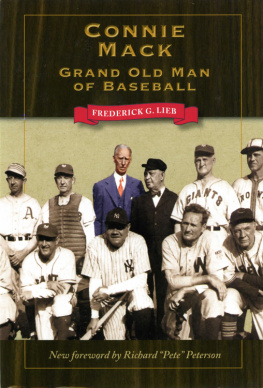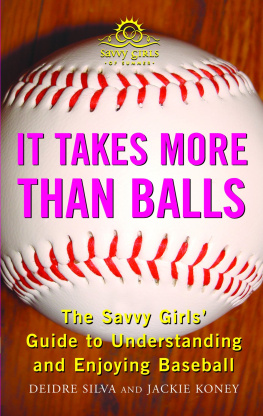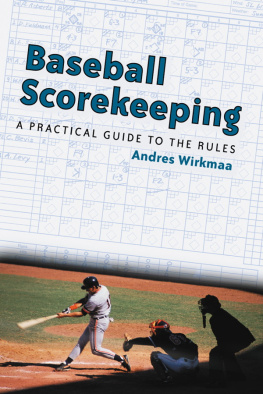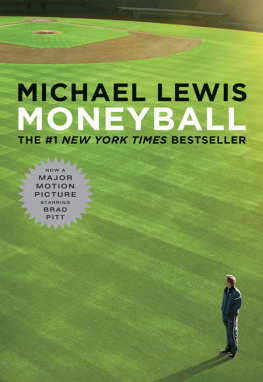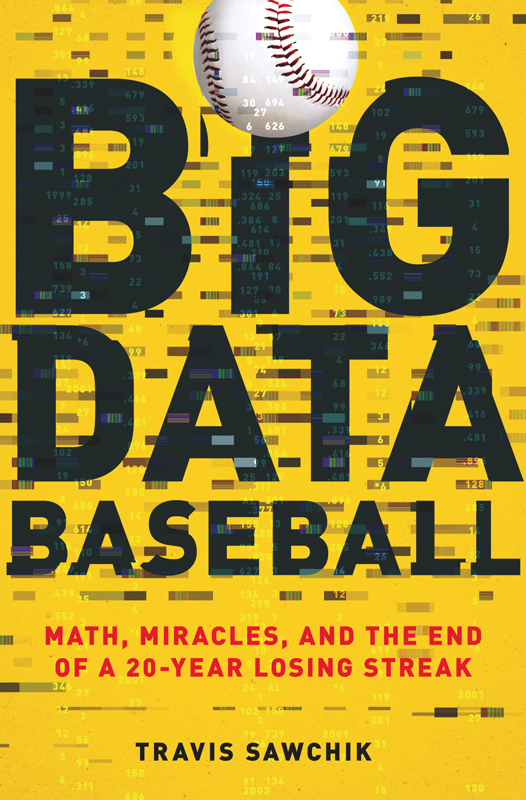Contents
Guide

The author and publisher have provided this e-book to you for your personal use only. You may not make this e-book publicly available in any way. Copyright infringement is against the law. If you believe the copy of this e-book you are reading infringes on the authors copyright, please notify the publisher at:
us.macmillanusa.com/piracy.
THIS BOOK IS FOR MOM, DAD, AND REBECCA
He believed in fearing nothing, respecting everything. He said that often. Still, if Clint Hurdle had felt no apprehension the day he waited for a visitor at his home in early October 2012, it would have been unnatural. Outside his home, the gray sky provided a stark contrast to the vibrant orange, yellow, and red of the trees in the rolling hills in western Pennsylvania. A mild depression fell over many coaches and managers when the season ended. Baseball was something you lived and breathed for nearly eight months, from when pitchers and catchers reported to spring training in February and lasting through the early fall. Then, like that, it was gone. His team, the Pittsburgh Pirates, was no longer playing baseball now that the play-offs had started. Twenty years had passed since the Pirates last landed in the postseason. This was the problem clouding Hurdles thoughts as he waited.
Before hed accepted the job as manager for the Pittsburgh Pirates, a number of his closest friends had counseled him against taking the position. He recalled the phone calls: It was a dead end, they told him. The Pirates hadnt made the postseason in twenty years; heck, they hadnt had a winning season in that long, the longest such streak of futility in North American professional-sports history. Not since the 1992 National League Championship Series, when Sid Bream beat a throw home from Barry Bonds for the winning run of Game 7, had the Pirates played in the postseason. That day when Sid slid home was the day baseball died in Pittsburgh.
A lot had changed since those last great Pirates teams. Players, coaches, and executives had come and gone. Attendance declined. The only year-to-year consistencies were the losing and the little money being spent on the club. The revenue gap between large- and small-market teams had grown dramatically since the early 1990s, fueled by the explosion and disparity in regional television dollars. It meant the Pirates had no high-priced free agents to bolster their roster. The Pirates Opening Day payroll in 2010 ranked last in baseball at $35 million, while the average league payroll was $89 million. Their farm system was also hurting due to a series of missed opportunities in the draft, such as in 2002 when the Pirates selected Bryan Bullington as the number one draft pick over future stars like Prince Fielder, Zack Greinke, Scott Kazmir, Nick Swisher, Matt Cain, and Cole Hamels. Bullington was just one of several great draft busts in recent memory.
Hurdle knew the Pirates had clearly fallen in status to the number three sports team in Pittsburgh behind the Steelers in the NFL and the Penguins in the NHL. Both franchises had recently won championships. Meanwhile, the Pirates had not drawn more than 2 million fans to their stadium since 2001.
Hurdles friends advised him to wait for another job opportunity with a team that wasnt considered among the worst franchises in North American professional sports. But what his friends wouldnt say, although they didnt have to, was that Hurdle had only one more shot to make it as a major league manager. If he lost this job, he was unlikely to get a third chance at managing. He was no longer a young man, having turned fifty-five in July. So why take a chance in Pittsburgh?
He listened to and processed the many reasons he should turn down the job. But still, he couldnt.
Hurdle had spent the 2010 season as the Texas Rangers hitting coach. He knew that he wanted to manage, not be an assistant. Like most baseball coaches, Hurdle preferred to wield the ultimate power of a coach: filling out a lineup card. He enjoyed leading. He liked having his hands on different aspects of a club, not being a specialist in one area. Perhaps more than anything else, he thought that rehabbing the baseball club in Pittsburgh could be a special story. He enjoyed a challenge.
After much deliberation, Hurdle decided he wanted the job. He felt it was the right fit, but he had to convince his wife, Karla, that it was the right move for them. They loved living in Denver, where Hurdle previously managed the Colorado Rockies so Hurdle had to convince her that Pittsburgh was not just some cold, undesirable industrial city. He could sell her on the citys renaissance. Pittsburgh had made perhaps the most successful transition of all the Rust Belt cities. After the steel mills closed and so many in the city struggled, a healthy medical industry began to develop along with a burgeoning tech niche. As the coal mines running under the city and its suburban hills quieted, a thriving natural gas industry developed. Home prices had not collapsed and the local economy had not crashed, as in so many cities across the country in the late 2000s.
However, Pittsburghs baseball club remained in dire need of revitalization. A new stadium, PNC Park, opened in 2001, not far from where the Pittsburgh Alleghenies had begun playing professional baseball in the city in the nineteenth century. But in contrast to the sparkling new facility, the organization itself had fallen destitute on the field. Could its baseball club enjoy a rebirth like the city? Hurdle believed that it could. He convinced Karla that he was confident he could make things work in Pittsburgh.
On November 14, 2010, Hurdle was officially hired by the Pirates. He often spoke of full buy in to ideas or practices and to show commitment to the city and the team he became a full-time resident. Hurdle bought a spacious colonial, brick residence, resting on a large plot in the suburban hills of Hampton Township, fifteen miles north of the stadium.
Two years later, he waited in that same home; his confidence in rebuilding the Pirates had been encroached upon by time and doubt. He had just one year left on his contract, and his first two seasons with the team had been losing ones. He had been a major league manager for ten years, first with the Colorado Rockies, and nine of those seasons were losing ones. During games he appeared to go through an entire carton of bubble gum, his mouth constantly chewing like a factorys stamping press, seemingly as a way to reduce stress. This off-seasons anxiety however wasnt fixated on just the outcome of one game. Beginning late in the last season, it was difficult for anyone to avoid hearing the publics call for a restart, for a change in the Pirates leadership. Hurdle could well be on the move again, which would be difficult on his family. The kids, Maddie, ten, and Christian, seven, were settled and comfortable now. Had he made the right decision in coming to Pittsburgh? In truth, it didnt matter now. He vowed to never look back and second-guess himself. He had been through adversity before. He was here now and he had to fix it.
Hurdles first two seasons as Pirates manager had not gone well. The club had enjoyed surprising winning records through the first half of both the 2011 and 2012 seasons, raising hopes and expectations, then performed horribly in second halves, ending with consecutive-losing-seasons nineteen and twenty. Pittsburghers referred to the second halves of 2011 and 2012 as Epic Collapse I and Epic Collapse II. Hurdle knew he could not afford an Epic Collapse III.


